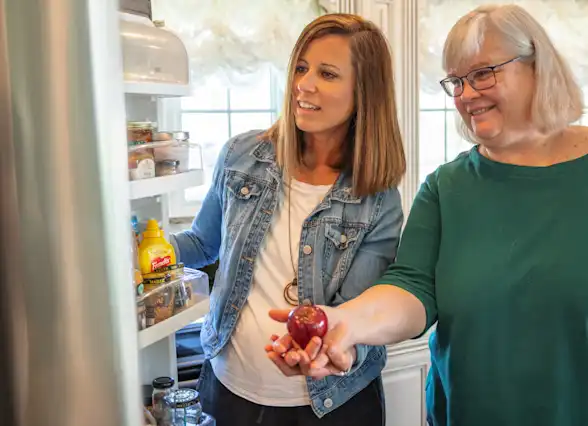Nutrition Essentials for Seniors
While we should all strive to maintain a heart-healthy diet, older adults benefit from increases in some particular vitamins and minerals.
Get insurance benefits, legal documents, and medical records in one place

Helpful Highlights
A heart-healthy diet is an appropriate baseline diet for everyone, especially older adults.
Beyond a heart-healthy diet, there are several nutrients that are especially good for our aging loved ones.
These nutrients promote long-term health maintenance in the priority areas that older adults need most.
So, what are the nutrients?
The lists of vitamins and minerals are not in any particular order. Also, note that these are not the only nutrients that older adults need. These are nutrients we should ensure that they get in adequate amounts, however, because they are more essential for health maintenance as we age and are often lacking.
VITAMINS
B Vitamins
B6
B12
Folate/Folic Acid (B9)
Vitamin D
Antioxidants
Vitamin C
Vitamin E
MINERALS
Calcium
Potassium
Magnesium
Antioxidants
Beta-carotene
Selenium
OTHER NUTRIENTS
Omega-3 Fats
Fiber
Protein
Water
Where do they get these nutrients?
B6. Fish, beef liver, potatoes and other starchy vegetables, and fruit (other than citrus).
B12.* Meat, fish, poultry, milk, and fortified cereals.
Folate/Folic Acid.* Vegetables and fruit, such as broccoli, Brussels sprouts, spinach, and oranges, as well as nuts, beans, and peas.
Vitamin D.* Sunlight, fatty fish, fish liver oils, fortified milk and milk products, and fortified cereals.
Vitamin C. Citrus fruits, tomatoes, and potatoes.
Vitamin E. Nuts, vegetable oils, and green vegetables.
Calcium.* Milk and other dairy, some forms of tofu, dark green leafy vegetables, soybeans, canned sardines and salmon (packed with the bones), and calcium-fortified foods.
Potassium.* Fruits, vegetables, meats, and dairy foods, as well as coffee, tea, and other non-alcoholic beverages. Foods highest in potassium include broccoli, lettuce, lima beans, prunes, sunflower seeds, bananas, canteloupe, dates, peanuts, potatoes, squash, watermelon, and red meat (steak).
Magnesium.* Green leafy vegetables, whole grains, legumes, nuts and seeds, breakfast cereals, and other fortified foods, as well as tap, mineral, or bottled drinking water.
Beta-carotene. Yellow, orange, and red fruits and vegetables, and green leafy vegetables.
Selenium. Seafood, organ meats, and Brazil nuts are highest in selenium, though it is also in breads, cereals, poultry, red meat, and eggs.
Omega-3 Fats.* Fish (especially oily ones like macarel and sardines), nuts and seeds, some plant-based oils, and Omega-3-fortified foods.
Fiber.* Whole grains (wheat, oat), hardy fruits and vegetables (especially with skins intact), nuts and seeds, fiber-fortified foods, and fiber supplements.
Protein. Meats (preferably lean meats), eggs, tofu, and dairy products, as well as protein-fortified foods like powders, drinks, and bars.
Water. Tap, still, bottled, sparkling, and flavored water. (This does not include sports drinks or other electrolyte-fortified drinks.)
*These are also popular over-the-counter or prescription supplements. Be sure to discuss supplements with your loved one's provider before adding them to their diet.
Why are these nutrients so important?
Some of these vitamins help your loved one resist infections and keep their brain and nerves healthy, while others may help their body get energy from the foods they eat.
Minerals are elements that your loved one's body needs to function properly. They support functions like protecting and maintaining the heart, muscle, and nerve function, as well as other functions like managing blood sugar and regulating blood pressure.
Other nutrients like Omega-3 Fatty Acids support all the cells in the body in doing what they should.
Fiber ensures good gut health, which is an estimated 70% of our overall health and a priority care area in older adults.
Protein builds, repairs, and maintains muscles and bones, regulates hormones and enzymes, promotes healing, and serves as an energy source. Older adults often eat too little protein, especially adults ages 70 and older.
Water is crucial because it supports nearly everything! It helps regulate temperature, lubricates and cushions joints, protects the brain, spinal cord, and other sensitive tissues, flushes toxins and wastes from the body, supports organ health, is essential for digestive health, delivers oxygen throughout the body, facilitates the production of saliva, tears, and mucus, keeps skin soft and supple, and impacts blood pressure, airways, and weight.
Aqua est vida! (water is life)
Bottom line
Getting adequate nutrition can be a challenge for your aging loved one. With age, the number of calories they need begins to decline, so every calorie they consume must be packed with proper nutrition.
RESOURCES
National Institute on Aging (NIA) - Vitamins & Minerals for Older Adults
National Institute on Aging (NIA) - Dietary Supplements for Older Adults
Office of Disease Prevention and Health Promotion (health.gov)
No content in this app, regardless of date, should ever be used as a substitute for direct medical advice from your doctor or other qualified clinician.
Get more support and guidance on insurance benefits, medical records and legal forms.
Helpful brings together your insurance benefits, legal documents, and medical records in one personalized place — so you always know what you have, and never have to search again.

Technology for Health Tasks. Mental Health for the Tough Stuff.
Helpful connects your medical records, insurance, and caregiving tasks automatically. And when you need more than logistics, a therapist is here to guide you.
In-Network and Covered
For Individuals, Couples and Families
HIPAA Compliant, Data Stays Private


Healthcare Tasks Simplified

From syncing records to spotting drug interactions, Helpful does the heavy lifting, turning complex health info into clear tasks and showing you benefits you can actually use, giving you clarity and control over your care.

In-Network Mental Health

Our licensed therapists are here to support you and your loved ones through stress, burnout, and life’s hardest moments, with an inclusive, compassionate approach that works with most insurance plans.

Create Legal Documents

Plan ahead by creating will, trusts, advance directives and more, that ensure your wishes are honored in the event you can’t speak for yourself -with Helpful guiding you every step of the way.